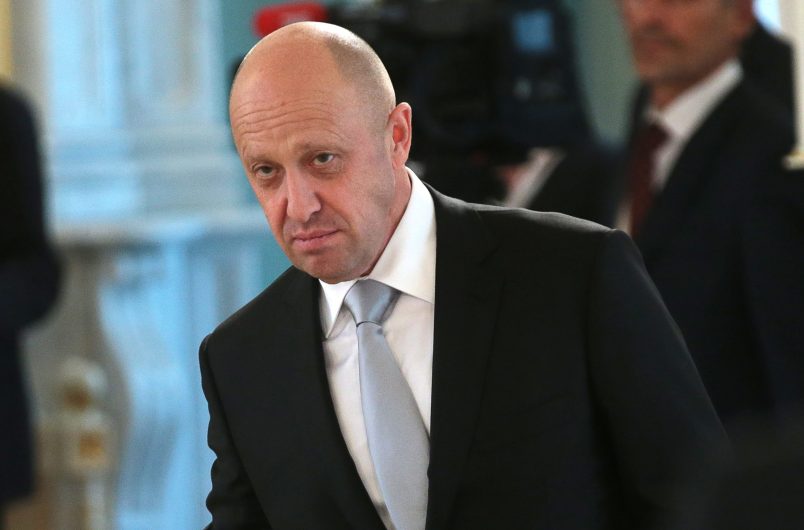The two years of fractious proceedings were a lesson in the downside of engaging with the trolls.
Ahead of an April 1 trial start date in the Justice Department’s case against Russia’s election-meddling internet trolls, prosecutors sought to dismiss the case against the company that had shown up in court to fight the charges.
In a court filing Monday evening, prosecutors cited the company’s “eager and aggressive” efforts to use the judicial system “to gather information about how the United States detects and prevents foreign election interference.”
“[T]he government must weigh the benefits of securing a guilty verdict against the costs of presenting the case at trial, including the potential harms of exposing information and sensitive techniques of great importance to law enforcement, the intelligence community, or both,” the DOJ’s request for dismissal said.
The judge granted the dismissal Monday night. Soon after, the company told Reuters it was planning a $50 billion lawsuit against the U.S. for unlawful prosecutions and the sanctions that have been imposed on it.
When special counsel Robert Mueller unveiled the February 2018 grand jury indictment against Russian individuals and companies accused of using social media to tamper in the 2016 election, no one ever thought the case would go to trial.
But how that prediction finally came true Monday was not in the way that any legal observers foresaw. Concord Management — a company run by a Kremlin-aligned oligarch that Mueller charged with conspiracy to defraud the U.S. — made the unexpected move of hiring American lawyers who showed up in court to fight the charges.
From the get-go, their defense was confrontational, as prosecutors were drawn intro several spats over discovery, Mueller’s authority and the validity of the case.
Prosecutors said Monday that they had been “skeptical” of Concord’s initial appearance in court, that the company’s presence in the case continued to be “ephemeral,” and that, if convicted, the company faced “no exposure to meaningful punishment.”
The final straw for prosecutors was when the company in recent weeks appeared to blow off a court-approved trial subpoena, by allegedly withholding relevant documents the government says it knows Concord possessed.
“In short, Concord has demonstrated its intent to reap the benefits of the Court’s jurisdiction while positioning itself to evade any real obligations or responsibility,” prosecutors said Monday.
In a statement to reporters, Concord’s lawyer Eric Dubelier, of the U.S. firm Reed Smith, pushed back on the prosecutors’ Monday assertions.
“The government can spin this result however they want but it will not change the fact that we won and they lost,” Dubelier said. “And taking cheap shots at Concord and its owner on their way out of the case is abusive and improper. We were ready to try and win the case. It is now apparent that they were not.”
Concord Management is run by Yevgeniy Prigozhin, a Russian restauranteur who has been nicknamed “Putin’s chef” due to his links to the Russian president. Prigozhin was also an individual defendant in the February 2018 indictment, but had not himself submitted to the court’s jurisdiction. His involvement behind the scenes of Concord’s aggressive tactics became increasingly clear, culminating in a declaration defending the firm’s handling of the trial subpoenas.
Prosecutors said Monday that Prigozhin’s declaration contained “false and misleading statements” and that it was “evidently calculated to conceal facts that are relevant to this case and that a typical defendant would be required to reveal or else face sanctions. ”
Prosecutors had previously raised concerns about sharing discovery with the company, for fear that handing the materials over to Prigozhin would expose sensitive U.S. law enforcement techniques to the Russian government.
On Monday, the Justice Department said that that the proceedings had incurred the “costs of disclosing sensitive non-public information in discovery that has gone to Russia.”
Going to trial, the Justice Department concluded, “would expose additional details about law enforcement’s tools and techniques for investigating malign foreign influence, among other crimes, potentially undermining their effectiveness.”
While the Justice Department also sought dismissal of the case against another Prigozhin company, Concord Catering, it noted Monday that it had not dropped the case against the individual defendants, which include Prigozhin.
“The United States will continue its efforts to apprehend the individual defendants and bring them before this Court to face the pending charges,” the filing said.
Read the dismissal request below:



